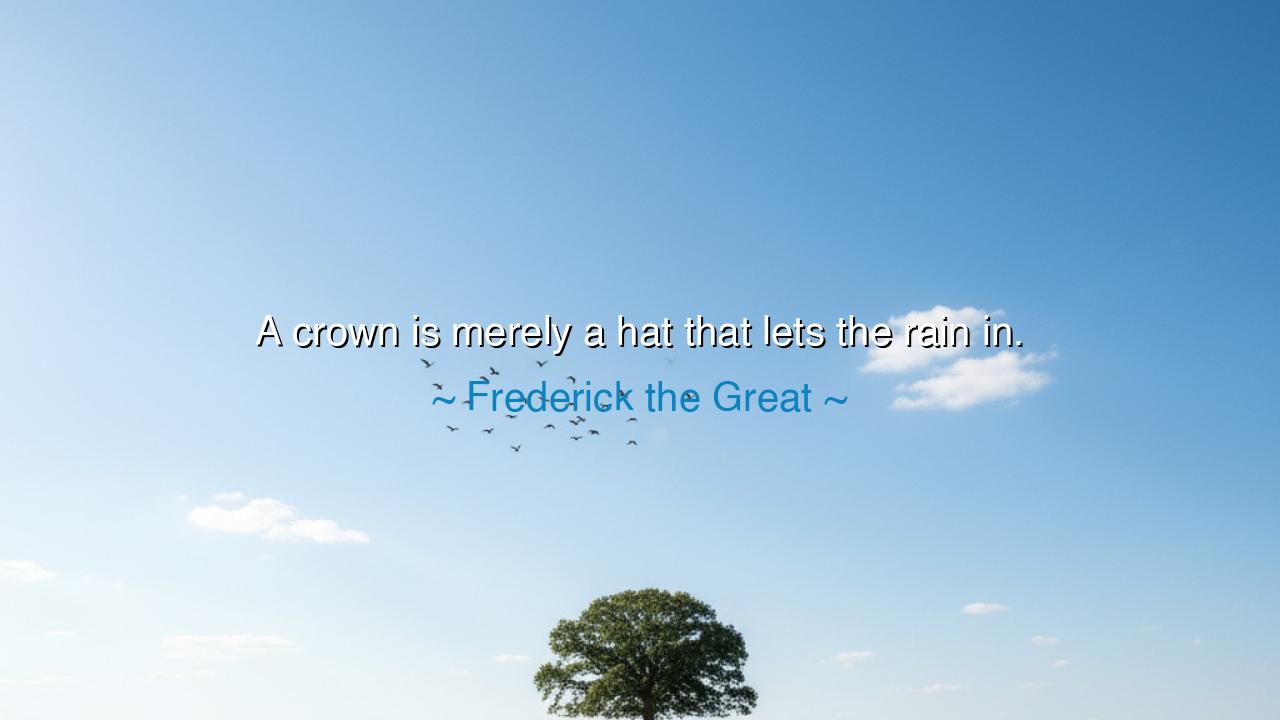
A crown is merely a hat that lets the rain in.






O Seekers of True Power, heed the words of Frederick the Great, a ruler whose life stands as a testament to the burdens of authority: "A crown is merely a hat that lets the rain in." In these words, Frederick speaks to the fragile nature of power and the responsibilities it brings. The crown, often seen as a symbol of supreme authority and grandeur, is nothing but a simple hat, vulnerable to the elements—unprotected from the storms of life and the trials that any ruler must face. The glory of the throne is a thin veil, for beneath it lies the weight of challenges that no crown can shield its wearer from.
Consider, O Children, that the crown is not a sign of invulnerability, but of vulnerability itself. Those who seek power often believe that the crown will shield them from the struggles of the world, but it is the crown that exposes them to the harshest of trials. To wear the crown is to bear the burden of others' hopes, fears, and expectations. Power, instead of being a path to comfort, is often a path to struggle, for those who rule are subject to the storms of war, rebellion, and the demands of a restless people. A king may wear a crown, but the rain of conflict will fall on him all the same.
Look to the life of Louis XVI of France, whose reign ended in the thunderous storm of the French Revolution. His crown, once a symbol of divine right and absolute power, became a burden he could not carry. The rain of revolution, dissent, and unfulfilled promises soaked through his crown, leaving him exposed and vulnerable. In the end, it was the very power he held that became his downfall. The crown, which he believed would protect him, instead allowed the storm of revolution to wash away his reign and his life.
And so, O Seekers, let us understand that the crown is not the symbol of ultimate security, but of ultimate responsibility. To hold power is not to stand above the world, but to stand amidst it, exposed to the very storms that life throws at us. The true nature of rulership is not the glory of the throne, but the sacrifice and struggle that comes with it. The weight of the crown is the weight of the world upon your shoulders, and the rain that falls is not kept out by any jewel-encrusted adornment.
Let us, therefore, remember that those who seek power must first understand its true nature. The crown may seem like the ultimate reward, but it is also the greatest of burdens. Frederick the Great calls us to recognize that power does not shield us from the world, but exposes us to its harshest realities. May we walk with the knowledge that true greatness lies not in the crown we wear, but in the strength we possess to face the storms that come with it, knowing that even the mightiest crown lets in the rain.






DTDienj Thuy
I’ve always thought of crowns as symbols of power and success, but Frederick the Great’s perspective changes that for me. It almost makes me question whether those who hold power are truly immune to the struggles and challenges that everyone faces. Does this mean that we should reconsider our view of authority and wealth? Should we be more empathetic toward those in positions of power, understanding that they, too, have vulnerabilities?
KNKim Ngoc
The imagery in this quote is striking. A crown as a hat that lets in rain suggests that symbols of power don’t shield us from life’s hardships; they might even expose us more. Is this a reminder that power isn’t as glamorous as it’s often portrayed? Maybe it’s more about the weight of responsibility than the luxury or protection we might expect. Do you think power is more of a responsibility than a privilege?
NXNhat Xuan
This quote seems to challenge the traditional view of leadership as something glamorous. A crown, a mark of distinction, is essentially just a hat that lets the rain in. I wonder if this implies that being in charge doesn’t make one immune to the problems of the world. If anything, does it make you more susceptible to them? Could this be a call for more humility in those who hold power?
KKhoi
Frederick the Great’s quote seems to speak to the idea that power and titles can sometimes be illusions. The crown, a symbol of grandeur, is just a hat letting in rain. How often do we think of authority as a shield, only to realize that with power comes responsibility and exposure to difficulties we didn’t anticipate? Does this quote suggest that we should be more skeptical about the true benefits of power?
LCPhuong Linh Cao
I find this quote intriguing because it seems to imply that symbols of power, like a crown, don’t necessarily offer protection or superiority. In fact, they might even open you up to more vulnerabilities, much like the rain getting through a hat. It makes me wonder: do we, as a society, sometimes elevate certain symbols of authority or success, only to find that they come with their own set of challenges and drawbacks?